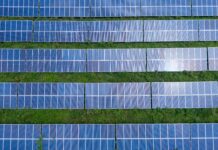by Doug Young
Chinese solar panel makers have taken an important step to solving their ongoing trade spat with the west by formally launching a private sector trade association to speak on their behalf. The move gives the panel makers their first truly commercial representative to discuss the matter with peers in the US and Europe, providing a better alternative to the government-backed groups that previously spoke for them.
This kind of step is long overdue, and should help to de-politicize and hopefully solve what is largely a commercial matter, involving western claims of unfair state subsidies. China should encourage and support the formation of more such independent industry associations led and run by actual companies as an important tool to reduce broader frictions with its major trading partners.
China’s solar panel sector has been locked in a dispute with the west for much of the last 3 years, following a prolonged industry downturn that has led to numerous bankruptcies worldwide. The west argued that China helped to create the huge oversupply that sparked the downturn by giving unfair subsidies to homegrown companies through policies like tax breaks and low-interest loans.
Amid the turmoil, the US last year imposed punitive tariffs against Chinese panels and is now on the verge of implementing a second round of penalties to close a loophole in the earlier ruling. The European Union also threatened to impose its own tariffs, but reached a last-minute settlement last year after negotiating an agreement with a group representing the Chinese panel makers.
Now that settlement is also in danger of unraveling, following recent allegations by European panel makers that the Chinese firms are not honoring the agreement.
In the EU case, the Chinese panel makers were represented in negotiations by the Chamber of Commerce for Import and Export of Machinery and Electronic Products, a government-backed industry group. Such government-backed groups have traditionally been the main spokesmen for various Chinese industries, mostly for historical reasons. But due to their government connections, they often carry strong political overtones that sometimes hinder realistic, commercially-based discussions.
In a bid to break that cycle, the solar panel makers recently formed their own industry association, the China Photovoltaic Industry Association (CPIA). Last week the group elected the CEO of Trina Solar (NYSE: TSL), one of the industry’s largest players, to become its first president for the next 5 years. (company announcement)
The CPIA’s includes most of the sector’s major manufactures, such as Trina, Yingli (NYSE: YGE), Canadian Solar (Nasdaq: CSIQ) and JA Solar (Nasdaq: JASO), meaning it can truly represent the entire industry when dealing with issues like the current trade wars. Equally important, the group has also committed to maintaining close ties with the Chamber of Commerce for Import and Export of Machinery and Electronic Products, ensuring that Beijing will remain informed on all the latest developments in industry issues.
This kind of independent trade group formed and run by actual companies is quite common in the west, where governments realizes that such independent associations can best represent the interests of their individual members.
In a bid to solve the clash in the US, the locally based Solar Energy Industries Association (SEIA) offered up a plan last year suggesting the Chinese manufacturers set up a fund that could help to compensate US rivals for some of their losses due to unequal state support. (previous post) The SEIA is one of several private groups representing the sector in the US, and its plan has yet to gain any traction, at least not publicly.
But the group’s proposal shows that private industry organizations can often propose innovative plans that are better suited to solving trade disputes than those offered by governments that are less familiar with individual issues. By comparison, China’s deal with the EU deal resulted in a plan for Chinese companies to voluntarily raise their prices to be on par with European rivals. The EU plan’s current troubles hint that the Chinese manufacturers were never fully committed to the proposal, perhaps because of their limited participation in the negotiations.
The formation of the CPIA could provide some fresh new impetus to solve the current disputes, since the Chinese panel makers now have their own group that can directly speak on their behalf. The creation of more such groups could help to reduce China’s trade frictions with the west in other areas by providing creative solutions crafted by companies themselves, which are always the biggest losers when such disputes result in unilateral punitive actions.
Bottom line: A new private solar industry association could bring fresh impetus to solving an ongoing trade dispute between China and the west over state subsidies.
Doug Young has lived and worked in China for 15 years, much of that as a journalist for Reuters writing about Chinese companies. He currently lives in Shanghai where he teaches financial journalism at Fudan University. He writes daily on his blog, Young´s China Business Blog, commenting on the latest developments at Chinese companies listed in the US, China and Hong Kong. He is also author of a new book about the media in China, The Party Line: How The Media Dictates Public Opinion in Modern China.






